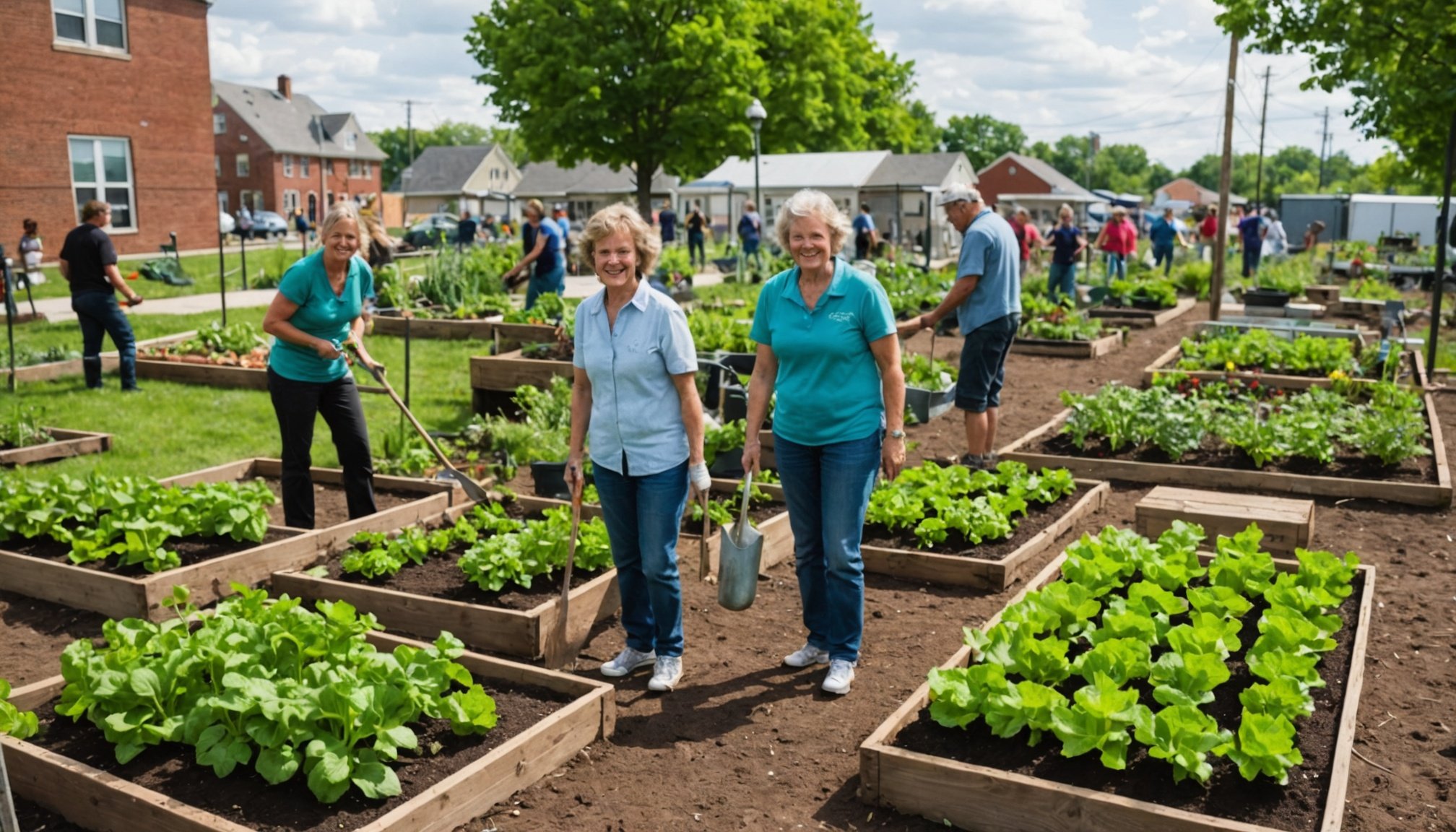Benefits of Community Gardening
Community gardening offers a variety of benefits that address physical, mental, and social wellbeing. Engaging in community gardening provides significant physical health benefits, including increased exercise and improved nutrition. By participating in these gardening activities, individuals engage in physical labor which promotes cardiovascular health and strengthens muscles. Moreover, the produce grown can contribute to a healthier diet, providing fresh and organic options to urban residents.
In addition to physical advantages, community gardening has a profound urban gardening health impact on mental health. Gardening activities can be a therapeutic escape from daily stressors, resulting in reduced stress and anxiety levels. The act of nurturing plants and witnessing growth fosters a sense of accomplishment and enhances mood, leading to overall mental wellbeing improvement.
Have you seen this : Revitalize your digestive health: explore the therapeutic benefits of herbal tea remedies
Socially, social bonding through gardening is another extraordinary benefit. Community gardens are vibrant hubs that bring people together, creating opportunities for interaction and collaboration among diverse groups. These activities foster social cohesion, leading to strengthened community ties and enhancing mutual support networks. Participants often share knowledge and experiences, further bonding through a common purpose. Together, these aspects of community gardening significantly contribute to urban resilience and enhanced quality of life.
Case Studies in Urban Gardening
Exploring successful urban gardening initiatives provides valuable insights into their impact. A shining example is the Nottingham Community Garden, which transformed a vacant lot into a verdant oasis. This project not only revitalized the neighbourhood but also bolstered local food security by providing fresh produce to residents. Another remarkable case is the New Roots Garden in Leeds. This initiative, driven by community collaboration, has been instrumental in enhancing social cohesion and promoting cultural exchange among a diverse population.
Also to see : Unlocking the benefits of gluten-free diets for individuals with non-celiac gluten sensitivity
Notable Community Garden Projects
Many cities have embraced community gardening as a tool for urban greening. The Incredible Edible project in Todmorden, for instance, integrates public vegetable patches in landscapes across the town. This approach has inspired similar movements globally, demonstrating the potential of community empowerment and collaborative urban revitalization.
Impact on Local Communities
Community gardens like the Glasgow Growing Spaces have shown measurable benefits, including improved environmental awareness and increased community resilience. More than just planting, these gardens cultivate connections, fostering an inclusive environment that nurtures knowledge sharing and mutual support. Their influence extends beyond nutrition, enhancing overall community wellbeing and engagement.
Testimonials from Community Garden Participants
Community gardens offer rich personal insights from participants who eagerly share their transformative experiences. Individuals frequently recount how their involvement in gardening projects has significantly enhanced their personal health. Engaging in gardening activities promotes physical exercise and subsequently improves overall fitness levels, while also providing a steady supply of nutritious produce for healthier dietary options.
Beyond the tangible health benefits, many participants highlight the profound influence of community gardening on their emotional well-being. Gardening serves as a therapeutic outlet, offering relief from everyday stressors through the calming act of nurturing plants. This practice not only fosters individual peace and satisfaction but also lifts the collective mood within the community.
Equally compelling are the stories of connection and bonding forged through these activities. Participants often describe how shared gardening efforts spark meaningful community relationships, creating lasting connections among diverse groups. These stories emphasize a newfound sense of belonging and illustrate how gardening cultivates understanding and friendship.
Such testimonials underscore the power of community gardening to foster community engagement and resilience. As individuals collectively reap the benefits of health improvement and social cohesion, the garden becomes a beacon of rejuvenation and shared purpose, knitting together the fabric of urban life.
Fostering Social Connections through Gardening
Community gardening acts as a vibrant catalyst for building community through gardening, bringing people together from diverse backgrounds in urban settings. By fostering interactions among varied groups, gardening initiatives create ecological hubs where individuals bond over a shared passion for growth and sustainability.
The essence of social capital in urban spaces is captured in these gardens, where practical tasks like planting and harvest naturally encourage conversation and cooperation. This process nurtures deeper social networks, enhancing resilience within the community. As participants work side-by-side in gardens, they develop mutual understanding and support, crucial for thriving urban environments.
Community resilience via gardening is evidenced as these bonds empower participants to tackle challenges collectively. Overcoming barriers to social connection is vital in urban areas where isolation may thrive. Gardens bridge this gap, offering inclusive spaces for informal socialising and structured collaboration alike.
Gardening initiatives can help to dismantle isolation by providing avenues for interaction, learning, and cultural exchange. They engage both newcomers and locals, creating a tapestry of relationship-building opportunities. Through community gardens, cities not only cultivate plants but also grow the spirit of cooperation and unity—a vital ingredient for future urban thriving.
Actionable Tips for Starting a Community Garden
Starting a community garden can seem like a daunting task, but by following a few essential steps, anyone can create a thriving urban space.
Initial Steps to Launch a Community Garden
-
Site Selection: Choose a location that offers adequate sunlight and access to water. Community involvement is key, so involve local residents to gauge interest and support.
-
Planning and Design: Begin with a draft of the garden layout. Consider elements like pathways, plots, and communal areas. This enhances urban gardening tips and sets a foundation for success.
Engaging the Community and Building Support
To achieve sustainable community engagement in gardening, initiate meetings with potential participants. Discuss goals and share urban gardening tips for effective collaboration. Tap into local organisations for resources and expert guidance.
Maintaining a Successful Garden
Once established, sustaining community engagement is pivotal. Keep everyone motivated by organising regular workshops and social events. Allocation of maintenance duties ensures shared responsibility, while periodic reviews can help address issues proactively. By nurturing both the garden and its community, long-term success is achievable.











